- Home
- Claudia Mills
Standing Up to Mr. O.
Standing Up to Mr. O. Read online
The author and publisher have provided this e-book to you for your personal use only. You may not make this e-book publicly available in any way. Copyright infringement is against the law. If you believe the copy of this e-book you are reading infringes on the author’s copyright, please notify the publisher at: us.macmillanusa.com/piracy.
Contents
Title Page
Copyright Notice
Dedication
Chapter 1
Chapter 2
Chapter 3
Chapter 4
Chapter 5
Chapter 6
Chapter 7
Chapter 8
Chapter 9
Chapter 10
Chapter 11
Chapter 12
Chapter 13
Chapter 14
Also by Claudia Mills
Copyright
To Elaine Chubb, who shows (again) that copyediting can be exquisite
1
Mr. O. was wearing Maggie McIntosh’s favorite tie, the one that looked like an enormous, bright yellow Crayola crayon. Seated on top of his desk, he waited for the bell to finish ringing. Then he grinned down at the fourth-period, seventh-grade biology class. Maggie felt as if he were smiling especially at her.
“Okay, campers, winter break is over, the new year has begun, and I want you to tell me: How many psychiatrists does it take to change a light bulb?”
Maggie waited expectantly, not even trying to guess the answer. She wasn’t good at jokes or riddles, and she didn’t know anything about psychiatrists. She didn’t think anyone in their class had ever been to a psychiatrist, except maybe Jake Dycus, whose black leather jacket and sullen silence made him seem like the stereotype of a “troubled” kid. But Maggie loved Mr. O.’s light bulb jokes, anyway. Even after four months, Mr. O. hadn’t run out of them. It was another reason why Mr. O. was Maggie’s favorite teacher, maybe even her favorite human being.
No one called out an answer. Then Mr. O. said, “One … but the light bulb has to really want to change.”
He laughed, and Maggie laughed with him, even though she wasn’t sure why the joke was funny. Mr. O. had such an infectious chuckle that she wanted to laugh whenever he did.
Sharing Maggie’s lab table, the middle one in the front row, Matt Dixon tapped impatiently on his opened notebook with his pencil as if to say, Are we finished with joke time yet? Matt never laughed at any of Mr. O.’s jokes. Jokes were beneath him.
Mr. O. glanced at Matt. “Moving right along,” he said, “today in Camp Biology we begin the study of Annelida.” He jumped down lightly from his desk and wrote the word on the board in his bold, clear handwriting. “The phylum of segmented worms.”
Maggie turned around to look at her best friend, Alycia Eagen, who sat with Kip Edwards at the lab table right behind hers. Maggie knew that Alycia had been dreading the worm unit as much as she had. Both girls had hated worms for as many years as they had been friends, ever since they had stood together on the playground on rainy days back in second grade, shrieking whenever they saw a worm writhing on the wet blacktop. But Alycia’s face managed to show only intelligent interest in whatever Mr. O. was going to say next.
“This is also the week,” Mr. O. said in the matter-of-fact, business-as-usual voice that he used to drop major bombshells, such as the time he announced that half the class had failed the last exam. “This is also the week we will do our first dissection.”
Kip Edwards called out, “Are we going to dissect a worm?”
Mr. O. paused for effect. Then he grinned. “We are.”
Maggie felt a shock of dread. She had known when she signed up for biology that they were going to do dissections, but biology was a required subject, so she hadn’t had any choice except to take it. And once the course began, back in September, Maggie had loved it, and Mr. O., so much that she had let herself forget the inevitable, half convincing herself that maybe Mr. O. would forget, too.
There was no way Maggie could dissect a worm. There was no way she could kill a living thing and cut it up into tiny pieces. She would have to explain it to Mr. O., and he would understand, as he did the time she’d panicked before the first biology test, when he had been so patient and encouraging. Or the time she had told him about her father.
She focused back on the present. The class was still registering its reaction to Mr. O.’s announcement. Some of the other girls looked as ill as Maggie felt, but some of the boys were cheering. Kip Edwards was pantomiming chopping up a worm with what appeared to be a machete. Jake Dycus looked even more sullen and surly than usual. Matt wore his trademark expression of superior disdain.
“They’re being pretty infantile, don’t you think?” Matt finally said to Maggie. Because Maggie was as good a student as Matt, occasionally he was willing to speak to her as an equal.
Maggie nodded. How could anybody cheer at the idea of killing something? Even though Maggie hated worms, she would never want to see one killed, destroyed, its small, insignificant existence snuffed out.
“These kids need to get a life,” Matt went on. “Medical students dissect corpses. It’s all part of science. Medical students don’t cheer about it or gag about it; they just do it because it’s the best way to learn about the human body.”
Maggie greatly doubted that people in medical school never gagged at the sight of a corpse. Medical students probably fainted onto the floor on a regular basis. But she didn’t want to be drawn into an extended conversation with Matt. She wanted it to be September again, with the prospect of dissections far in the distant future.
Mr. O. let the commotion go on for another minute. Then he blew on the whistle that he wore around his neck to show that he was the head counselor for Camp Biology.
“Listen, campers,” Mr. O. said. “I know this will be a new experience for most of you, maybe for all of you.” His voice had become gentle, and even though Maggie was staring down at her desk, she could tell that he was looking at her as he spoke. “Remember, we’re all in Camp Biology together. If you’re nervous about your first dissection, your lab partner will help you, or I’ll help you. Most people are a bit scared and squeamish the first time. But we’re all going to get through this. Okay? Okay.”
Maggie felt a little better, because Mr. O.’s tone was so calm and reassuring, but not much better.
“We will dissect an earthworm on Friday,” Mr. O. went on. “Today I want you to begin getting to know your worms.”
With a flourish, he whisked the cover off the large glass terrarium that stood on a rolling table next to his desk. “Our class worm farm,” he announced. The terrarium was filled almost to the top with moist dirt. Maggie thought she could see something tunneling through the dirt. Quickly she averted her eyes.
“Every pair of lab partners will get its very own worm,” Mr. O. said. “One of these glass jars”—he pointed to a row of mayonnaise jars by the window, each half-filled with soil—“will be your worm’s motel.”
“Worms check in,” Kip Edwards said solemnly, “but they don’t check out.”
Very funny, thought Maggie. But some kids laughed.
“All right,” Mr. O. said, “come on up, one table at a time, grab a jar and a paper plate, and we’ll do our best to find each of you a nice, juicy worm.”
“A paper plate? Are we going to eat the worms?” Kip asked. More laughter. Mr. O. grinned. He liked a lot of kidding around in his classes.
When it was Maggie and Matt’s turn, Maggie hid herself behind Matt as he held out their jar to Mr. O. Since she was the shortest girl in the class—half a head shorter than Alycia—she managed to shield herself from direct contact with the worm terrarium. But she could see Mr. O. stirring through the dirt with a large woode
n spoon as if he were searching for raisins in a huge bowl of bran cereal.
“Here’s one for you,” he said. With the spoon, he scooped out the worm and deposited it, wriggling, in Matt and Maggie’s jar. Maggie swallowed hard. “Next!”
When everyone had a worm, Mr. O. called the class to attention with another blow on his whistle. “Okay, take your worms out of the jars and put them on the paper plates. The paper plates will be your worm observation platforms. Go ahead, watch them for a while. You can poke or prod them a bit with your pencil eraser, if you do it gently. Pay attention. See what they do.”
Maggie sat frozen. So Matt reached into the jar and, to Maggie’s horror, actually picked up their worm with his bare fingers. Maggie gave one involuntary shudder and stifled the urge to scream. She couldn’t believe that not a foot away from her lay a loose, slimy, slithering worm that could any minute come wiggling off the plate toward her unprotected hand. She snatched her hand off the table, into the relative safety of her lap, and inched her chair a bit farther away from Matt.
“Hey, Maggie,” Kip whispered piercingly from behind her. “You’re not afraid of worms, are you?”
Maggie tried to ignore him. Why wasn’t he asking the same thing of Alycia? Alycia was Kip’s lab partner, after all, and Maggie hadn’t given Kip any reason to tease her: so far she hadn’t done a single, solitary thing to betray her fear. Except for one little startle. And one swallowed scream.
“Hey, Maggie, my worm is getting away!” Kip called out merrily. “It’s off its plate! It’s heading toward your shoulder!”
Maggie refused to respond. She hoped Kip was kidding. But she didn’t want to turn around to see.
“It’s coming closer, Maggie.” Kip made his voice low and ominous. Maggie tried to tune him out.
“Oops, Maggie, I’ve lost it! Look out!”
Maggie felt something soft and limp land in her hair. She couldn’t help herself: she screamed. Whenever she tried to scream in a nightmare, no sound came out. Here it did.
Someone—Matt?—reached over and plucked the thing out of her hair.
Finally, she made herself open her eyes. Matt, whose ears must still be hurting from the intensity of her shriek, held dangling from his hand a thick, brown, six-inch-long … rubber band.
“Kip, what is going on here?” Mr. O. was beside their table, his hand warm and steadying on Maggie’s shoulder, real anger in his voice.
“I didn’t throw a worm at her, honest I didn’t. It was just a rubber band.”
“Is that true, Maggie?”
Maggie was too embarrassed to answer. She could only watch as Matt dropped the offending rubber band onto Mr. O.’s outstretched palm.
“It was a joke,” Kip said loudly. “I didn’t think anybody would be scared of a rubber band.”
“All right,” Mr. O. said, giving Kip—and Maggie?—an uncharacteristically stern look before he headed back to his desk. “I think we’ve had enough introduction to our worms for today. Put your worms away and get out your notebooks.”
Maggie felt her cheeks burn with shame as Matt calmly returned their worm to its jar. How could she have known it was a rubber band? Kip had tried as hard as he could to make her think it was a real live worm. Though she had to admit that most people wouldn’t have screamed the way she had even for a real live worm, let alone for a real live rubber band.
Mr. O. still looked angry. Was he mad at Kip? At her? Both of them?
“Jake.”
Jake Dycus had actually raised his hand to ask a question. Usually Jake showed no interest in school whatsoever. Usually he sat doodling on his desk with a sneering smile playing at the corners of his mouth.
“I was just wondering: What happens if you refuse to do the dissection?” Jake flipped back his hair as he spoke. He had an intense, interesting face, usually half-hidden by his jet-black hair, worn a lot longer than the other boys wore theirs. Maggie liked to watch him sometimes, because he was so different from everybody else in their class. Now he was the only one daring enough to ask Maggie’s own unspoken question.
“Refuse?” Mr. O. asked, as if he didn’t understand the word.
“What if you think dissections are immoral?”
“Anyone who does not complete a required lab assignment for any reason receives an F for that assignment.” Mr. O.’s voice had an unfamiliar edge to it, perhaps left over from his irritation at the rubber-band scene. “If you receive three or more F’s in the trimester, you receive an F for your final grade.”
But, meeting Maggie’s worried eyes, Mr. O. let his face melt into a smile, and Maggie felt a rush of grateful relief. He wasn’t angry at her, after all.
“All right, campers.” Mr. O turned to the board. “Annelida. The name is from the Latin. Annellus means ‘little ring.’ Segmented worms are made of joined segments, or rings.”
Maggie picked up her pen and started taking notes, covering line after line in her notebook with her neat, small script. But although one part of her mind was paying attention to Mr. O.’s lecture, the other part was focused on Friday. Maggie didn’t want to dissect a worm, and she didn’t want to get an F in biology, either—not in her favorite subject, not from a teacher she loved.
How many biology students does it take not to dissect a worm? Somehow Maggie was going to have to find out.
2
“What are we going to do?” Maggie asked Alycia as the two girls hurried down the crowded halls of Grand Valley Middle School to lunch. She could hear her voice squeaking, the way it did when she was agitated about something.
“It’s okay,” Alycia said calmly. “I already figured it out.”
“And?” Maggie asked, trying to make her voice low and unmouselike.
“I’m going to let Kip do it. It doesn’t matter which person actually does it. I mean, one of us has to be the one to hold the knife, or the scalpel, or whatever it is. It might as well be Kip.”
Kip would do it for Alycia, too. Maggie had a feeling he liked Alycia, or at least respected her. After all, he hadn’t thrown a rubber band in Alycia’s hair that morning.
Alycia made it all sound logical enough. Maybe Maggie could let Matt “do” their worm. But Maggie couldn’t count on Matt the way Alycia could count on Kip. Matt didn’t throw rubber bands at girls, but he didn’t do them favors, either. And Matt didn’t even laugh at Mr. O.’s jokes. He was so stern and serious, so committed to science, ready to dissect a human corpse if one were to be laid out conveniently in front of him. Matt wasn’t going to let Maggie get out of doing her fair share of the dissection.
Maggie would have to be sick on Friday. It wouldn’t be too hard. She felt sick already, just thinking about it.
No. It wouldn’t work. When people were sick for a lab, Mr. O. made them do a makeup lab after school the following week. Being sick didn’t get you out of a lab any more than it got you out of a test. However bad it would be to dissect a worm with Matt, it would be worse doing it all by herself after school, with Mr. O. watching every move she made—or didn’t make.
Maggie fought a surge of panic. She’d think of something by Friday; she had to.
What was Jake going to do? Maybe Maggie should ask him. In class that morning, he had sounded pretty opposed to dissections. But Maggie had never had a conversation with Jake, and she felt shy at the thought of trying to start one, especially given how good-looking he was, in his own dark, brooding way.
When they reached the cafeteria, Maggie and Alycia claimed their favorite table, by the window and far away from the noise and confusion of the cafeteria line. They always brought their lunches from home, anyway.
Maggie made her own lunch, usually peanut butter and strawberry jam on raisin bread, with a thermos of milk and a small bag of whatever cookies were on sale at King Soopers that week. Alycia’s mother made hers. Mrs. Eagen didn’t work, so she had time to copy lunches out of parenting magazines. Today Alycia had a pita-bread pocket stuffed with ham and cheese chunks and shredded lettuce, with pop
py-seed dressing in its own little chilled container for Alycia to add right before eating. In addition, she had cut-up vegetables, with dilled yogurt dip, and three plump, soft, homemade oatmeal raisin cookies.
Maggie liked peanut butter and jam. Still, as she looked at Alycia, pouring her poppy-seed dressing into her pita-pocket sandwich, Maggie couldn’t help feeling a spasm of envy, not so much for Alycia’s lunch as for the ease with which she had already figured out her escape from the worm dissection.
In English class sixth period, as Ms. Bealer droned on about the opinion essay that was due in two weeks, Maggie let her thoughts wander back to the topic of envy. Was it wrong to be jealous of your best friend? But how could you not be jealous when your best friend had everything? For starters, Alycia had: being tall; a mother who didn’t work (and who didn’t make sarcastic jokes all the time); being good at sports; living in Pinewood Preserve; pierced ears (Maggie’s mother considered all body piercing a form of mutilation); turning thirteen first (Maggie’s birthday was still a month away); and a father. To this list, Maggie now added: great lunches; and not having to do dissections.
Who wouldn’t be jealous of a friend like that? Even though Alycia never bragged about any of it and shared treats from her lunches as readily as she shared favorite books and patterns for the sewing and knitting projects that Maggie and Alycia liked to do together.
Was there anything at all that Maggie had that made her special? Until recently, Maggie would have had to answer no. Then, a few weeks ago, right before winter break, Maggie had had one of her long, after-school conversations with Mr. O. It was about evolution and divine creation and whether you could believe in both. Maggie had been afraid you couldn’t, but Mr. O. had said you could, that scientists who believed in God only believed in Him more when they learned about the wonderful way in which the world had evolved. Maggie had felt so grateful to Mr. O. that day, because that was exactly how she felt about the universe.
Then, afterward, Alycia had asked her, almost crossly, “What were you guys talking about this time?” and Maggie had known that the relationship she had with Mr. O. was different from the relationship Alycia had with him. Mr. O. liked all the kids in the class—even, or especially, the rambunctious boys whom he kidded so much. But he liked Maggie more. Maggie only hoped that he would still like her after Friday.

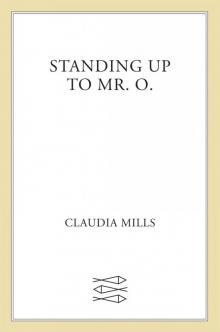 Standing Up to Mr. O.
Standing Up to Mr. O.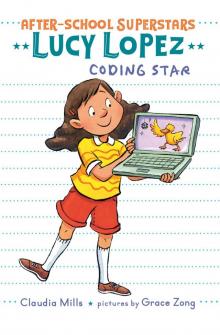 Lucy Lopez
Lucy Lopez Dinah Forever
Dinah Forever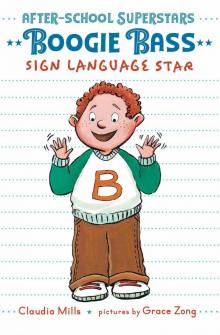 Boogie Bass, Sign Language Star
Boogie Bass, Sign Language Star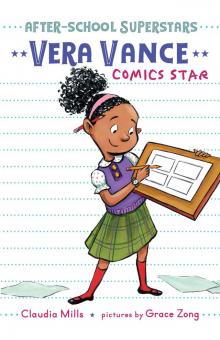 Vera Vance: Comics Star
Vera Vance: Comics Star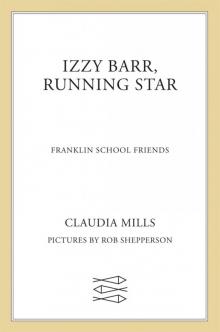 Izzy Barr, Running Star
Izzy Barr, Running Star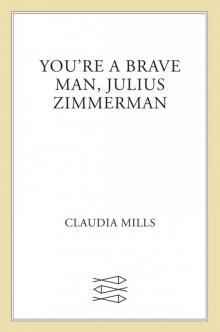 You're a Brave Man, Julius Zimmerman
You're a Brave Man, Julius Zimmerman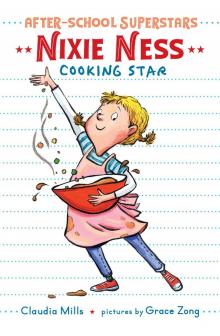 Nixie Ness
Nixie Ness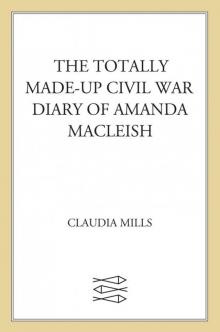 The Totally Made-up Civil War Diary of Amanda MacLeish
The Totally Made-up Civil War Diary of Amanda MacLeish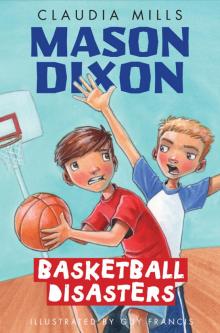 Basketball Disasters
Basketball Disasters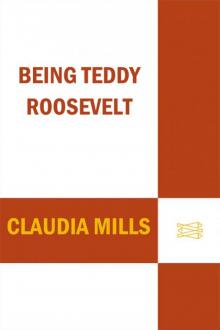 Being Teddy Roosevelt
Being Teddy Roosevelt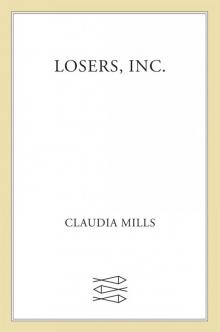 Losers, Inc.
Losers, Inc. The Trouble with Friends
The Trouble with Friends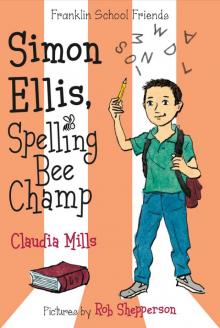 Simon Ellis, Spelling Bee Champ
Simon Ellis, Spelling Bee Champ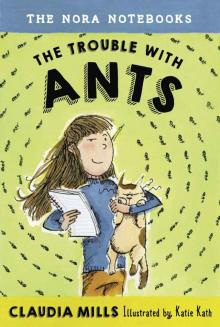 The Nora Notebooks, Book 1: The Trouble with Ants
The Nora Notebooks, Book 1: The Trouble with Ants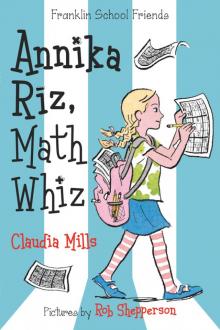 Annika Riz, Math Whiz
Annika Riz, Math Whiz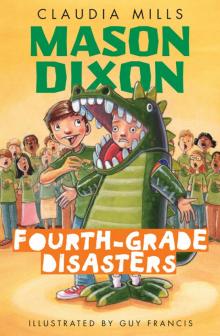 Fourth-Grade Disasters
Fourth-Grade Disasters Pet Disasters
Pet Disasters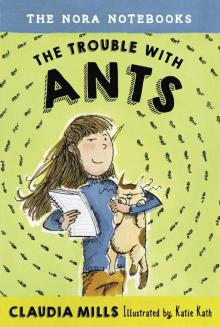 The Trouble with Ants
The Trouble with Ants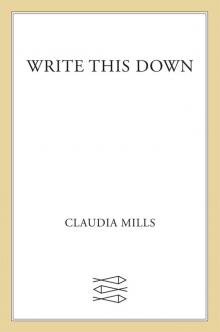 Write This Down
Write This Down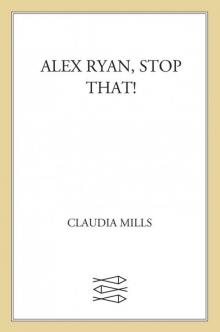 Alex Ryan, Stop That!
Alex Ryan, Stop That!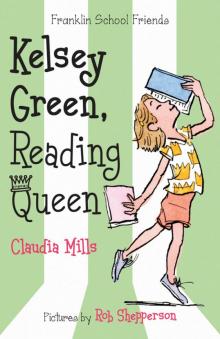 Kelsey Green, Reading Queen
Kelsey Green, Reading Queen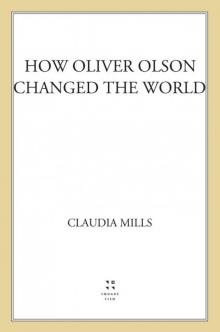 How Oliver Olson Changed the World
How Oliver Olson Changed the World Lizzie At Last
Lizzie At Last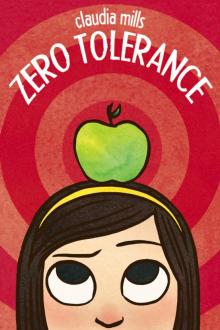 Zero Tolerance
Zero Tolerance The Nora Notebooks, Book 2
The Nora Notebooks, Book 2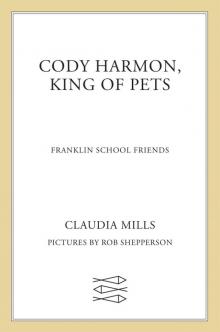 Cody Harmon, King of Pets
Cody Harmon, King of Pets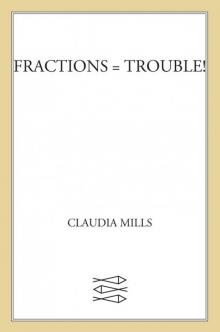 Fractions = Trouble!
Fractions = Trouble!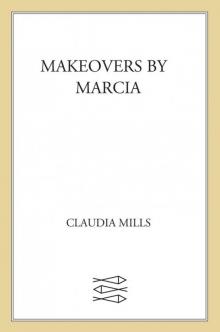 Makeovers by Marcia
Makeovers by Marcia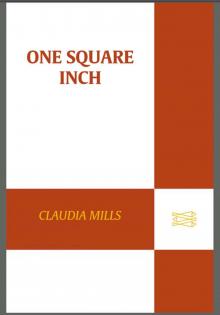 One Square Inch
One Square Inch